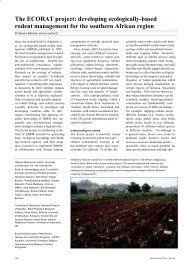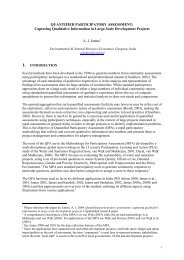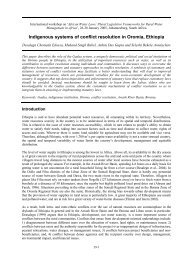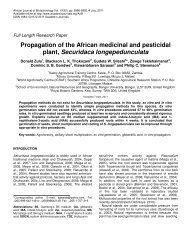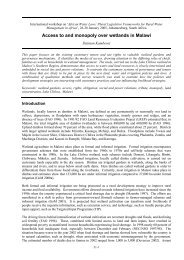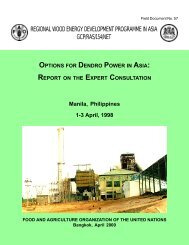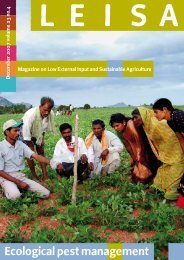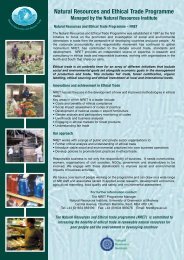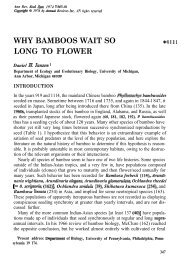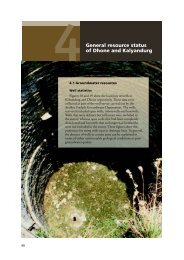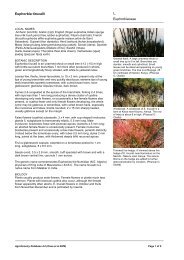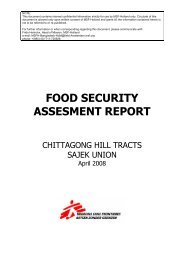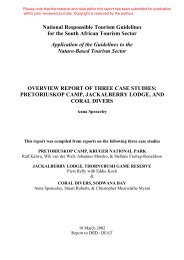Access to Rural Non-Farm Livelihoods - Natural Resources Institute
Access to Rural Non-Farm Livelihoods - Natural Resources Institute
Access to Rural Non-Farm Livelihoods - Natural Resources Institute
You also want an ePaper? Increase the reach of your titles
YUMPU automatically turns print PDFs into web optimized ePapers that Google loves.
Box 15. Theresa Okundi, basket maker<br />
Theresa is 37 years old. She came <strong>to</strong> Kitambuza from Ankole in 1984 when she was married,<br />
but was widowed in 1993 – however this is now her home. She provides for her three sons<br />
and her daughter by farming, although there is usually little for sale, and by making and<br />
selling baskets. She learnt <strong>to</strong> make baskets from her mother before she was married, but only<br />
started concentrating on it since the death of her husband. The children help with farming and<br />
housework <strong>to</strong> give her more time for basket making. Her daughter, who is 10, does not go <strong>to</strong><br />
school at all, and sometimes one or more of the boys stays home <strong>to</strong> help as well – at the<br />
moment, because the rains are so late, the children have a lot of work <strong>to</strong> do <strong>to</strong> bringing water<br />
<strong>to</strong> the bean seedlings so they do not all die. The materials for one basket cost about 1,000<br />
shillings, and Theresa sells the finished items for 1,500 shillings at the weekly market in<br />
Lwentulege. She makes between one and four baskets per month, depending on how much<br />
time she has. Lack of time is the main constraint, which she alleviates by having the children<br />
help her with farming, but poor markets are also a problem. Although profits are small, they<br />
constitute a significant portion of the household’s meagre income, and basket making has<br />
been important in helping her and her children survive since her husband’s death. They have a<br />
good brick house with a mabati(iron) roof, but this was built when her husband was still alive,<br />
but since then things have been much more difficult, and Theresa now describes herself as<br />
“poor”. She thinks there should be more support for vocational training for adults, for<br />
example, she has fruit trees, and would like <strong>to</strong> learn how <strong>to</strong> make jam, as well as <strong>to</strong> improve<br />
on her mat making skills. However, although she has no formal education herself, her main<br />
aspiration is <strong>to</strong> somehow get her children educated.<br />
Box 16. Rose Eculi, basket maker<br />
Rose is 30 years old. She was married, but her husband, a farm labourer, died three years ago,<br />
leaving her with just one son, who is now four years old. Although Rose herself has no formal<br />
education, her son is already in school. Rose farms, and sells a small amount of ma<strong>to</strong>oke and<br />
beans, and makes and sells baskets. She makes about two baskets per month, from which she<br />
gets about 1,000 shillings profit. She and her son live in a temporary thatched shelter, and<br />
own no furniture, although she is having a pole and mud house built. However, as a widow,<br />
this is difficult. Neighbours gave her the eucalyptus poles for the frame, and she has hired a<br />
man <strong>to</strong> build it for her on a credit basis, <strong>to</strong> be paid slowly over the next few months. However,<br />
work is also going very slowly. She describes herself as “among the poorest”, as she is all<br />
alone, with no one <strong>to</strong> help her. However, she sometimes helps her elderly neighbours by<br />
fetching water and firewood for them – they give her advice and encouragement, such as <strong>to</strong><br />
hang on <strong>to</strong> her land, and <strong>to</strong> keep her son. She can not imagine having another business – she<br />
has “no energy”.<br />
For skilled craftsmen, such as tailors, people go in<strong>to</strong> Lwentulege.<br />
5.3.3 Services<br />
For most services, such as bicycle mechanics, or clinics, people go in<strong>to</strong> Lwentulege.<br />
However, there is a trained and certified Traditional Birthing Attendant based in the village<br />
who serves a large area.<br />
54



